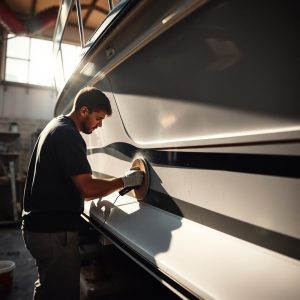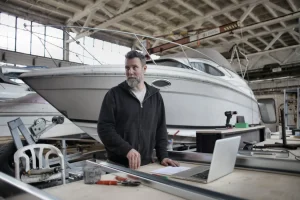The marine industry is undergoing a major transformation, driven by advances in propulsion technology. Traditional diesel engines are being replaced by cleaner, more efficient systems that reduce emissions and boost performance. Modern vessels now rely on solutions that support both sustainability and operational efficiency. Let’s explore the key innovations reshaping marine mobility today.
Why Marine Propulsion Systems Are Evolving?
With rising concerns over climate change and tighter emission regulations worldwide, marine propulsion systems manufacturers and shipbuilders face relentless pressure to innovate and adapt. Technological advancements promise improved energy efficiency, reduced pollutants, quieter operations, and superior maneuverability, making maritime transportation sustainable for future generations.
Electric Propulsion Systems
Electric propulsion stands at the forefront of this marine revolution. Unlike traditional engines driven by heavy fossil fuels, electric propulsion systems rely on electric motors powered by batteries or fuel cells, thereby producing zero emissions. This technology contributes significantly to eco-friendly marine travel, helping preserve sensitive aquatic ecosystems as well as protecting public health by substantially reducing toxins and noise pollution near shoreline communities.
Additionally, electric motors deliver instant torque for quicker acceleration and enhanced maneuverability, which is particularly advantageous when docking in busy harbors or navigating through restricted waterways. Its virtually silent operation also hugely benefits marine wildlife, avoiding disruption to sensitive marine habitats.
Hybrid Propulsion
Building upon the promise of electric power, hybrid marine propulsion systems strike a perfect balance by combining conventional internal combustion engines and electric motors. Ship captains can effortlessly switch between energy sources depending on operational requirements. During low-speed maneuvering or when entering environment-protected zones, electric power considerably reduces environmental impact; at higher speed requirements, traditional fuel propulsion seamlessly takes over.
Contributing further to their efficiency, many hybrid propulsion systems utilize regenerative braking technology to convert kinetic energy into electricity whenever the ship decelerates. This reclaimed energy is stored for future use, significantly reducing total fuel consumption and minimizing harmful emissions. Making hybrid technology ideal for diverse uses from ferries to large-scale cargo vessels, these systems bring unmatched convenience and flexibility.
Liquefied Natural Gas (LNG) Propulsion
Natural gas, specifically liquefied natural gas (LNG), is quickly becoming the preferred alternative for ships aiming for cleaner energy without sacrificing performance. Compared to conventional diesel and heavy fuel alternatives, LNG propulsion dramatically curbs pollutants, including carbon dioxide (CO2), sulfur oxides (SOx), nitrogen oxides (NOx), and particulate matter. As a result, LNG-powered ships effectively comply with stringent international maritime environmental standards without major operational hiccups.
Given the growing global investment in LNG fueling infrastructure, this alternative is expected to become even more accessible globally, propelling a steady rise in LNG-powered marine vessels. From large cruise liners to enormous cargo freighters and everyday passenger ferries, LNG propulsion is steadily charting a cleaner, healthier course for oceanic transit.

Promising Technologies Pushing the Limits of Marine Efficiency
Beyond conventional electric and hybrid solutions, advanced pioneering technologies continue to emerge, revolutionizing ship design and capability. These innovations challenge conventional thinking and promise radical outcomes in propulsion performance and sustainability.
Hydrogen Fuel Cells
Hydrogen fuel cells offer an intriguing glimpse into the future of maritime propulsion. The operation of a hydrogen fuel cell generates electricity through a chemical reaction involving hydrogen and oxygen, emitting only pure water vapor—a genuinely clean energy source. Although maritime hydrogen fuel cell technology remains at an early developmental stage, it bears immense potential due to superior energy density, adaptability, and zero harmful emissions.
This innovative technology could gradually lead marine propulsion toward achieve sustainability, significantly reducing ecological footprints and empowering shipbuilders towards greener vessel designs.
High-Tech Materials
New advanced materials like carbon fiber composites significantly increase propulsion efficiency and overall vessel performance. Propeller designs utilizing carbon fiber composites offer exceptional strength with significantly lighter weights compared to traditional steel or bronze. Consequently, these materials dramatically enhance efficiency, deliver lower fuel consumption, and improve overall reliability.
Simpler maintenance, longer lifespan, and enhanced seaworthiness make carbon fiber composite materials perfect candidates for modernizing marine propulsion systems going forward.
Embrace the Future of Maritime Mobility
The continuous evolution of vessel propulsion technologies like electric and hybrid solutions, LNG fuel systems, hydrogen cells, and advanced materials redefines maritime performance. Each development contributes notably to greener oceans, reducing harmful emissions, noise pollution, and fuel usage, while improving vessel responsiveness and operational efficiency. Adopting these innovative solutions ensures not only compliance with global standards but also elevates maritime operations toward more responsible practices.
To navigate this shift with confidence, partnering with a company that understands the latest propulsion technologies is essential. Florida Divers team brings the expertise and solutions needed to upgrade your fleet for performance, compliance, and sustainability.




